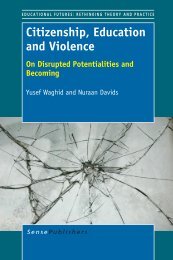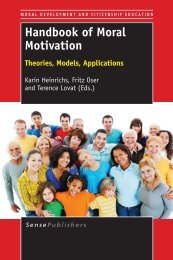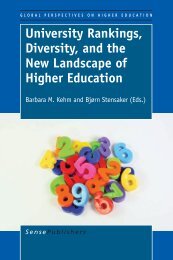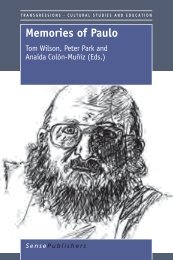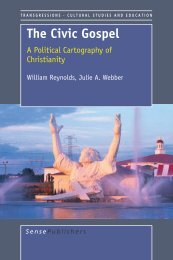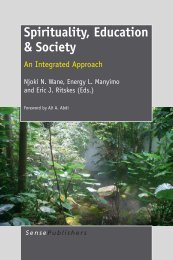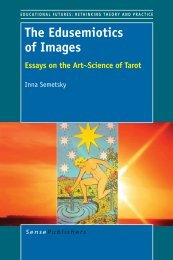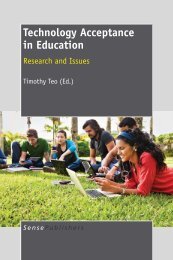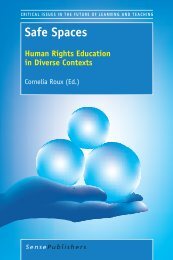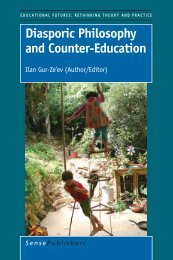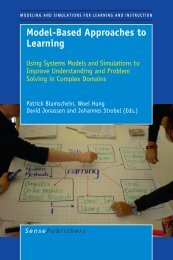Rupturing Concepts of Disability and Inclusion
Rupturing Concepts of Disability and Inclusion
Rupturing Concepts of Disability and Inclusion
Create successful ePaper yourself
Turn your PDF publications into a flip-book with our unique Google optimized e-Paper software.
CHAPTER 2<br />
Anomaly. Therefore, it seems that it would be futile to continue to shape inclusion<br />
policies <strong>and</strong> practices without giving due attention to redefining the structures <strong>of</strong><br />
signification, that is, the frameworks <strong>of</strong> meaning <strong>and</strong> valuation where the momentum<br />
<strong>of</strong> hidden ontological <strong>and</strong> epistemological assumptions keeps people with intellectual<br />
disability in particular socio-ethical positions within Judeo-Christian subcultures.<br />
14<br />
2.2 THE RELEVANCE OF A JUDEO-CHRISTIAN CONTEXT<br />
A Judeo-Christian society is a purposefully chosen context, because it serves not<br />
only as an ethnographic focus for analysis, but also as a locus for social change.<br />
There are two specific reasons for this. The first reason is that descriptions <strong>of</strong>, <strong>and</strong><br />
responses to, ‘impairment’ as described in the theological narratives recorded in<br />
the Hebrew Scriptures <strong>and</strong> Christian Scriptures have shaped practices <strong>of</strong> how<br />
“people <strong>of</strong> God perceived, treated, <strong>and</strong> lived with people with disabilities.” 44<br />
A second reason for choosing a Judeo-Christian context is that Christian churches,<br />
in the past <strong>and</strong> in the present, represent a large body <strong>of</strong> responders <strong>of</strong> care <strong>and</strong><br />
service-providers, <strong>and</strong> therefore, provide not only a site for historical reflections <strong>of</strong><br />
‘traditional’ practices, but also could be a site for creative refiguration <strong>of</strong> disability<br />
practices using contemporary scholarship. 45<br />
2.2.1 Biblical Underst<strong>and</strong>ings <strong>of</strong> <strong>Disability</strong><br />
Over the centuries, Christian responses <strong>of</strong> sin or sanctity, curse or compassion,<br />
ridicule, rejection or romanticisation, appear to have had significant historical links<br />
with the established <strong>and</strong> perpetuated dominant socio-symbolic order created from<br />
the orthodoxy <strong>of</strong> patriarchal theology. A religious cosmo-biological underst<strong>and</strong>ing<br />
<strong>of</strong> forms <strong>of</strong> disability mysteriously pondered the question if people were born<br />
either as punishment because <strong>of</strong> sin caused by moral impropriety particularly <strong>of</strong> the<br />
mother; or as special representatives <strong>of</strong> the Divine as agents <strong>of</strong> God’s grace. 46 This<br />
is exemplified biblically:<br />
As he walked along, he [Jesus] saw a man blind from birth. His disciples<br />
asked him, “Rabbi, who sinned, this man or his parents, that he was born blind?”<br />
Jesus answered, “Neither this man nor his parents sinned; he was born blind<br />
so that God’s works might be revealed in him.” (John 9: 1-3) 47<br />
How disability practices are embedded within a Judeo-Christian context can be<br />
understood by exploring biblical representations, interpretations <strong>and</strong> appropriations.<br />
This is critical to an ethical underst<strong>and</strong>ing. Deborah Selway <strong>and</strong> Adrian Ashman<br />
have previously claimed that literature on the impact <strong>of</strong> religious beliefs <strong>and</strong><br />
practices on people with disability is sparsely distributed across the fields <strong>of</strong><br />
studies in religion, health, aging <strong>and</strong> disability. Therefore, they claim that the<br />
“study <strong>of</strong> religious textual reference to disability is in its infancy.” 48 In conclusion,<br />
they suggest, “studies focusing on the role <strong>of</strong> religion in the lives <strong>of</strong> people with a<br />
disability themselves have yet to be conducted.” 49 However, whilst I agree that<br />
these are contemporary, <strong>and</strong> indeed, only recent areas <strong>of</strong> inquiry, I contend that



